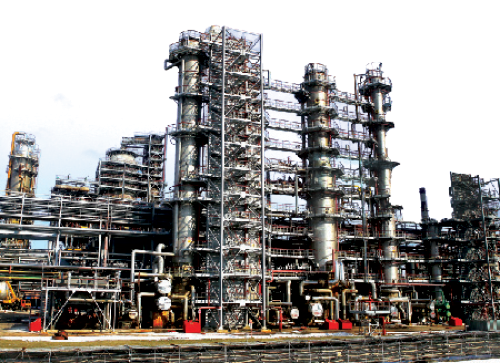By Nikolay Zhdanov
Mozyr’s Oil Refinery has been processing LK-6U oil since 1975, and has exported its petrol, diesel, boiler fuel and other products to over 20 countries over the past four decades. It currently exports 65 percent of its manufactures — to countries near and far.

In 2015, Mozyr Oil Refinery plans to move over completely to AI-95 petrol production
Deputy Director General Vitaly Pavlov notes that priority is always given to Belarus’ nearest neighbours, since delivery is easier, which maximizes profitability: about 35 percent of sales are to Ukraine (with volumes ever rising) and 11-12 percent of Mozyr’s products are shipped to the Russian market.
Mozyr’s popularity with suppliers and consumers is, no doubt, down to the quality of refining: who wants the volume of black oil exceeding that of light? 2014 sees the launch of 60 percent light oil products at Mozyr Oil Refinery, thanks to modernisation. Over the past decade, equipment has been updated every 1-2 years.
 Vadim Danilevich, Head of the Directorate for Reconstruction and Development of Production, tells us that high-octane components to process gasoline are being installed, with the new site already 40 percent complete. Major construction continues, with the line coming into commission next year, significantly aiding import substitution for expensive oxygen-containing additives. Meanwhile, four giant reactors are being installed for hydrocracking of heavy oil residues; they arrived this spring from Japan, having crossed two oceans, a sea and two rivers. The reactors will allow deep processing (to 90 percent) of tar, black oil and other inexpensive raw materials, producing light oil products with a high added value.
Vadim Danilevich, Head of the Directorate for Reconstruction and Development of Production, tells us that high-octane components to process gasoline are being installed, with the new site already 40 percent complete. Major construction continues, with the line coming into commission next year, significantly aiding import substitution for expensive oxygen-containing additives. Meanwhile, four giant reactors are being installed for hydrocracking of heavy oil residues; they arrived this spring from Japan, having crossed two oceans, a sea and two rivers. The reactors will allow deep processing (to 90 percent) of tar, black oil and other inexpensive raw materials, producing light oil products with a high added value.Clearly, such progress is of great benefit to the economy of the Gomel Region; over the first six months of 2014, Mozyr Oil Refinery led in contributions to local budget revenue. With its sustained policy of installing the latest technology, it should weather even the most difficult financial conditions.











